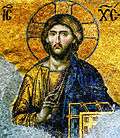Anatolius of Laodicea
| Saint Anatolius | |
|---|---|
| Bishop and Confessor | |
| Born |
early 3rd century Alexandria, Ptolemaic Egypt |
| Died |
July 3, 283 Laodicea, Roman Syria (now Latakia, Syria) |
| Venerated in | Roman Catholic Church; Eastern Orthodox Church; |
| Feast | July 3 |
| Part of a series on |
| Eastern Christianity |
|---|
 |
|
Liturgy and worship |
|
Anatolius of Laodicea (early 3rd century – July 3, 283[1]), also known as Anatolius of Alexandria, was Bishop of Laodicea on the Mediterranean coast of Roman Syria, and was one of the foremost scholars of his day in the physical sciences as well as in Aristotelean philosophy. He is considered a saint by the Eastern Orthodox and the Roman Catholic Churches
Life
Anatolius was born and raised in Alexandria, Egypt, during the early 3rd century. Prior to becoming one of the great lights of the Church, Anatolius enjoyed considerable prestige at Alexandria, and was credited with a rich knowledge of arithmetic, geometry, physics, rhetoric, dialectic, and astronomy.[2] According to Eusebius of Caesarea, Anatolius was deemed worthy to maintain the school of the Aristotelian succession in Alexandria.[3] The pagan philosopher Iamblichus studied among his disciples for a short time.[4]
There are fragments of ten books on arithmetic written by him, and also a treatise on time of the Paschal celebration.[2]
A story is told by Eusebius of the way in which Anatolius broke up a rebellion in a part of Alexandria known then as Bruchium. It was held by the forces of Zenobia, and being strictly beleaguered by the Romans was in a state of starvation. The saint, who was living in Bruchium at the time, made arrangements with the besiegers to receive all the women and children, as well as the old and infirm, continuing at the same time to let as many as wished profit by the means of escaping. It broke up the defence and the rebels surrendered. It was a patriotic action on the part of the saint, as well as one of great benevolence, in saving so many innocent victims from death.[5]
In going to Laodicea he was seized by the people and made bishop. Whether his friend Eusebius had died, or whether they both occupied the see together, is a matter of much discussion. The question is treated at length in the Bollandists.
St Anatolius' feast day, like that of his namesake Saint Anatolius of Constantinople, is celebrated on July 3.
Notes
References
- Acta Sanctorum, I, July
- Michaud, Biog. Univ.
- Sabine Baring-Gould, Lives of the Saints (London, 1872)
- "Lives of the Saints," Omer Englebert, New York: Barnes & Noble Books, 1994, pp 532, ISBN 1-56619-516-0 (casebound)
![]() This article incorporates text from a publication now in the public domain: Herbermann, Charles, ed. (1913). "article name needed". Catholic Encyclopedia. New York: Robert Appleton.
This article incorporates text from a publication now in the public domain: Herbermann, Charles, ed. (1913). "article name needed". Catholic Encyclopedia. New York: Robert Appleton.
Further reading
- Kieffer, John (1970). "Anatolius of Alexandria". Dictionary of Scientific Biography. 1. New York: Charles Scribner's Sons. pp. 148–149. ISBN 0-684-10114-9.
External links
 Works written by or about Anatolius of Laodicea at Wikisource
Works written by or about Anatolius of Laodicea at Wikisource- Paschal Canon
- The Paschal Canon of Anatolius of Laodicea
- Catholic Encyclopedia: St. Anatolius
- Complete Dictionary of Scientific Biography: Anatolius of Alexandria
- Anatolius d'Alexandrie: Sur les Dix Premiers Nombres, Sur la Décade et Les Nombres Qu'elle Comprend